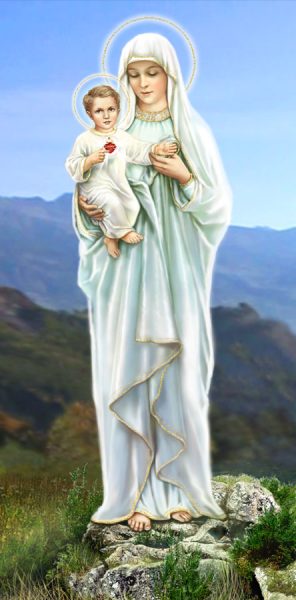A story for every day...

The rosary of the renowned artist Gluck
Marie-Antoinette’s music master, Gluck, was as religious as he was a good musician. Born of poor but honest parents, and above all fervent Catholics, he who was one day to shake the dust off the opera created in France by Lulli and restored by Rameau, owed it to a fortuitous circumstance to persevere in his family’s faith, despite all the seductions of the philosophical high society in the midst of which his beautiful talent launched him, during a long and brilliant career.
Like most of the great musicians, Gluck had begun to learn his art under the mystic vaults of a basilica; and the voice of the young choirboy was so beautiful, his naive expression so charming, that the number of the faithful was considerably increased every time little Christopher had to sing a motet. Nothing is more suitable to develop religious feeling in an ardent soul than the practice of the musical art in the very midst of the sanctuary. And how often Gluck as a child shed sweet tears of tenderness as he gazed at the windows of the choir, while the organ filled the vaults with its noble and severe harmony, and the sun cast its last golden rays through the windows, whose thousand colors shone with a pure and radiant brilliance!
One day when Gluck was leaving the choir, after having sung admirably a motet by Clari, he was accosted by a poor Religious who, with his eyes still wet, clasped him to his heart, congratulating him on his talent so true and so touching.
“Alas! I have nothing to give you as a token of my delight, my little friend, said the religious, nothing but this rosary… but keep it in memory of Brother Anselm, and above all promise me to recite it every evening, in honor of the holy Mother of God. This practice will bring you good luck, my young friend; and even if you are faithful to it, heaven, I have a secret presentiment, will bless your efforts; you will become great before men on earth, and worthy one day of the heavenly concerts in paradise.”
Christopher, surprised and touched at once by the Brother’s words, respectfully took the rosary offered to him by a hand thinned more by religious austerities than by age; he promised to recite it as long as he lived.
By the time he was fifteen years old, young Gluck had already given his parents proof of such precocious wisdom that his father, in charge of a large family, was only weakly opposed to the plan Christopher had formed to go to Rome to continue his musical studies. But how could he leave? How, alone and without help, would he go from the Austrian capital to the Catholic world, deprived, as he was, of basic resources?
Any other than the predestined child would have given up this project, judged impracticable for so many reasons. But he was not put off; full of confidence in the protection of the Queen of Angels, the musician who was later to become the favorite of two earthly queens, the musician whom Maria Theresa and Antoinette of Austria admitted to their palaces, recited the Angelical Salutation on Brother Anselm’s poor but precious rosary with even greater devotion.
One evening when Gluck, following his pious habit, had just comforted himself by praying the holy rosary, there was a loud knock at the door of his parents’ modest home… It was the Kapellmeister of Saint Stephen’s in Vienna, who had been asked by the Archbishop to go to Italy to collect the works of Palestrina, and who had come to ask Christopher’s father to act as his secretary.
Let us imagine the joy of Christopher. This authorization was granted with tears of gratitude; and, a few days later, Gluck rode on the way to Trieste with his good and learned teacher.
We will not follow our great artist during the twenty years he spent in Italy, where, always faithful to the promise he had made to Brother Anselm, he never failed a single day to say his rosary, a holy talisman which more than once protected him effectively.
Suffice it to say that when he returned to Vienna, and later when he was showered with honors at the court of Versailles, he knew how to tear himself away from the pleasures of a splendid rest or an interesting conversation, to go and recite in one of the corners of the royal salon, where he was admitted on an equal footing with the greatest of personalities, the rosary, which he called his musician’s breviary.
It was in such a religious frame of mind that Gluck spent his entire life; and his hand, which had been purified by writing the sombre and lyrical De profundis, was still holding the rosary, then well worn, of Brother Anselm, on the day when, struck by a lightning apoplexy, the immortal artist returned his soul to God.
(Father Huguet)



